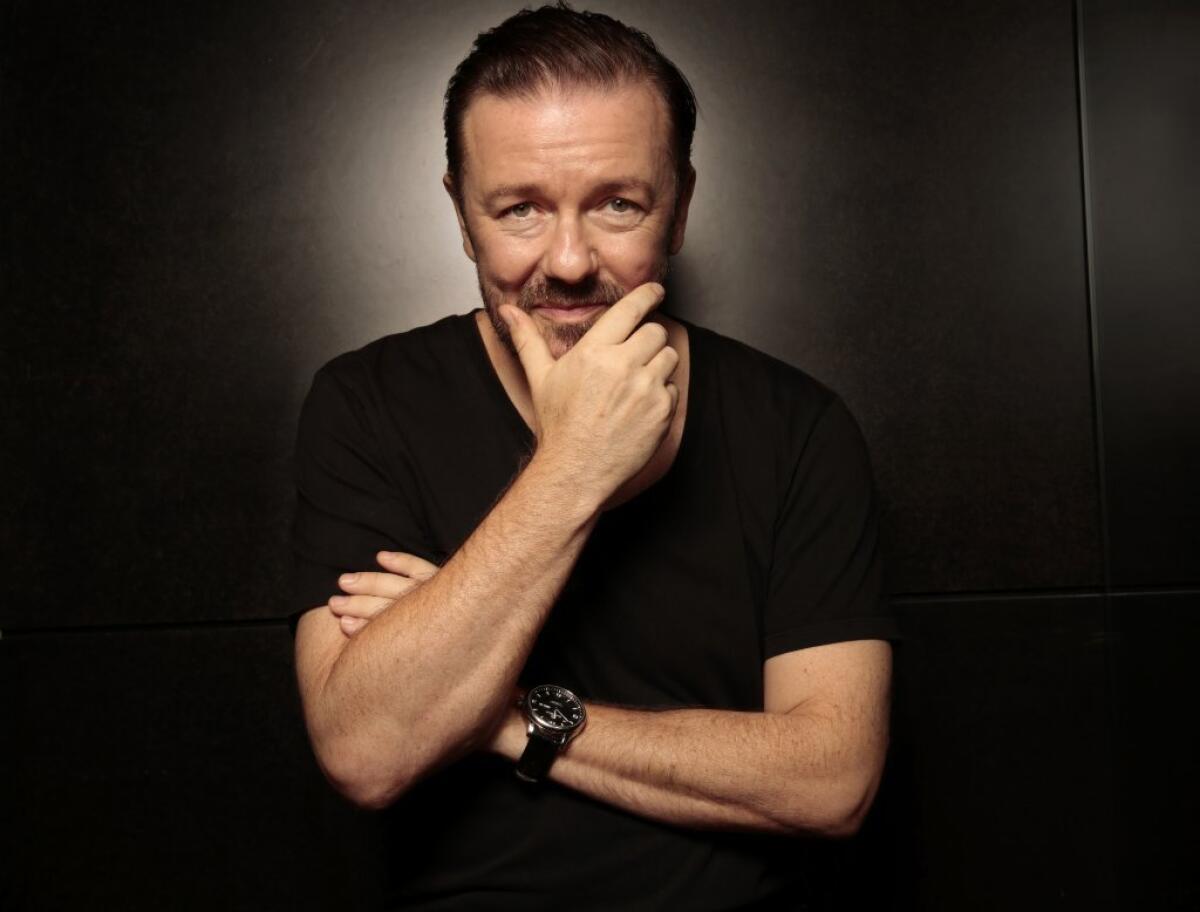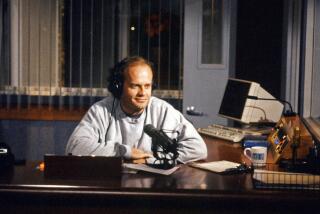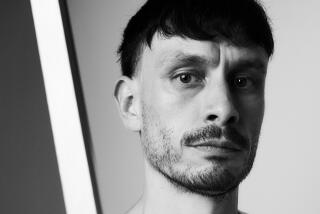This time, Ricky Gervais tries playing ‘nice’

Ricky Gervais doesn’t understand why you’re so afraid of him.
“People come up to me and say, ‘Oh, I was scared to ask for your autograph in case you put me down,’” Gervais says in a hushed tone during a recent interview in New York. “No, no, I would never do that.”
It’s not difficult to understand this misperception. Ever since “The Office” catapulted him to global fame a dozen years ago, the writer, director, actor and professional provocateur has come to be synonymous with a brand of humor that, although never truly mean-spirited, is fueled by discomfort.
Enjoying Gervais’ work, whether he’s ridiculing Hollywood’s A-listers to their faces at the Golden Globes or being serenaded by David Bowie as a “chubby little loser” in “Extras,” requires a well-developed taste for cringe comedy and a strong appreciation of irony.
FALL TV 2013: Watch the trailers
But the Netflix series “Derek,” which rolled out last month, finds Gervais, 52, venturing into earnest new territory. Though it employs the now-ubiquitous mockumentary format Gervais pioneered in “The Office,” the series otherwise lacks many of his creative hallmarks.
Most notably, instead of starring as a hapless buffoon or a thinly veiled version of himself, Gervais plays Derek Noakes, the simple-minded but big-hearted employee of an underfunded English nursing home. (Many have assumed that Derek, with his pronounced underbite and stooped posture, is on the autism spectrum; Gervais says he is not.)
“It’s more important to be kind than clever or good-looking,” he proclaims, through tears, in the pilot episode. This is more or less the message of the series, in which the villains are penny-pinching bureaucrats and haughty young people, and the heroes are the old and infirm and those who care for them.
Though it still contains plenty of off-color jokes, “Derek” is disarmingly sweet and sentimental — one might even say sappy. (How else to describe a poignant scene in the season finale set to Coldplay?)
PHOTOS: Leading ladies of the fall TV season
And that is the point, according to Gervais: “There’s a saying, ‘Kindness affects not only the person that you’re being kind to, but the person who’s being kind. It makes you feel better as well.’”
It is not the kind of Sunday School adage many would expect to hear from Gervais, an avowed atheist who uses his Twitter account (5 million followers and counting) to spar with evangelists, and who once said that bad parents should be sterilized.
Which may be why the British media were quick to assume he was making fun of the disabled when the “Derek” pilot premiered on British TV last year. Surely, it didn’t help that on Twitter he’d repeatedly used a derogatory British slang word for people with Down syndrome, or that his last series, HBO’s “Life’s Too Short,” was one long joke about little people.
Writing for the Guardian, Tanya Gold branded him a “self-serving hypocrite” who trafficked in “lazy cruelty.” Critics stateside, meanwhile, have been less confused by Gervais’ intent than by the show’s uneven tone. (“By turns, hilarious and histrionic, illuminating and infuriating,” said The Times’ Mary McNamara.)
FULL COVERAGE: Fall TV preview 2013
Although it’s tempting to say that with “Derek,” one of Hollywood’s most celebrated mischief-makers has gone soft, Gervais insists his outlook hasn’t changed. Instead, he says, people simply forget that he’s putting on a persona. “I’d be horrified to think that people believed some of the things I said in jokes. I play a misinformed bigot often.”
Still, that doesn’t mean Gervais is at ease playing nice. If anything, he says, creating a heartfelt show is “more worrying” than relying on the same shtick. “When you’re just being funny and mucking around ..., that’s a get-out clause. When you do something that you want people to take seriously, you’ve got to be careful.”
“Derek” may be a departure in terms of its tone, but it’s set firmly within the same commonplace, slightly rundown milieu as “The Office.” The goal, he says, is “making the ordinary extraordinary.” And it’s a world he knows slightly better than most comedians of his stature, given his own delayed path to stardom.
After a fleeting brush with fame in his early 20s as a member of the new wave group Seona Dancing — the band was big in the Philippines — Gervais quietly settled into a career in radio.
He co-created “The Office” with his then-assistant, Stephen Merchant (now starring in HBO’s “Hello Ladies”), and he was 40 by the time it became an international hit. Though Gervais clearly enjoys hamming it up with big-name stars such as Liam Neeson and Johnny Depp, it’s telling that his most frequent collaborators are Merchant and Karl Pilkington, who makes his acting debut in “Derek” and started out as a producer on his radio show.
PHOTOS: Hollywood Backlot moments
“I look at my them like found objects of art,” he says.
Viewers may also see similarities between Derek’s best friend Hannah (Kerry Godliman), whose unwavering commitment to the residents at the home puts a damper on her personal life, and other unfussy Gervaisian heroines, such as Dawn from “The Office” or Maggie in “Extras.”
“I’ve always tried to do strong women,” he says. “I’ve noticed in comedy that females are props. They’re either airheads being pursued by middle-aged men or they’re bitches because they care about their job.”
“Derek,” co-produced with Britain’s Channel 4, marks Gervais’ first series for Netflix, following a long and fruitful partnership with HBO.
“I heard they were doing original programming, and I heard people were getting nervous about it, and so I got Ted’s email,” Gervais says, referring to the company’s chief content officer, Ted Sarandos.
PHOTOS: Celebrities by The Times
The company’s hands-off approach to development appealed to his fascistic streak as an artist. “It’s like Internet freedom with network ratings,” he says.
Netflix also knew that Gervais was popular with its subscribers, and it leapt at the chance to collaborate. “For me, this was something completely outside of what you’d expect to be next from Ricky. I think everybody was expecting him to do some version of what he did before, and he never wants to do that,” says Sarandos.
When it comes to his own viewing habits, Gervais remains addicted to reality television, the genre that spawned “The Office.”
“Do you know ‘The Apprentice’? We did one, ‘The Young Apprentice.’ And I thought, ‘Oh, I can’t watch that, because I can’t hate 16-year-olds,’” Gervais says. “I was wrong. I hated them immediately.”
Sounds like a Ricky we know.
-----------------------------
‘Derek’
Where: Netflix
When: Anytime
Rating: TV-14 (may be unsuitable for children under the age of 14)
More to Read
The complete guide to home viewing
Get Screen Gab for everything about the TV shows and streaming movies everyone’s talking about.
You may occasionally receive promotional content from the Los Angeles Times.






